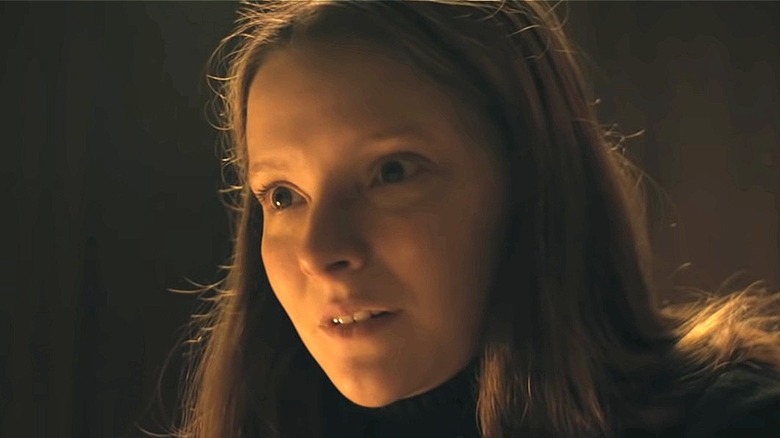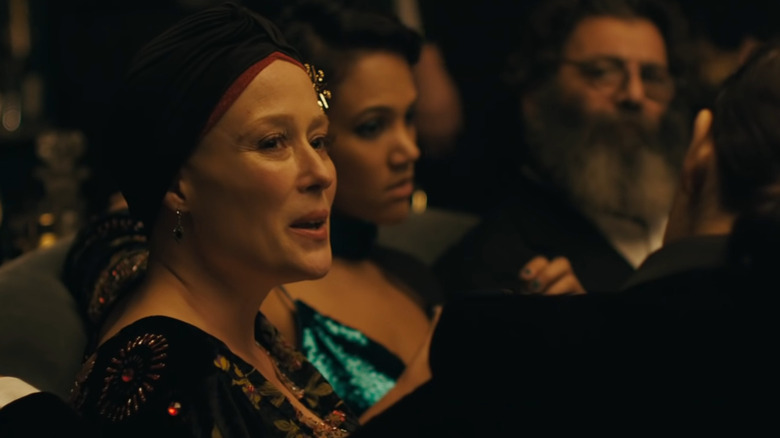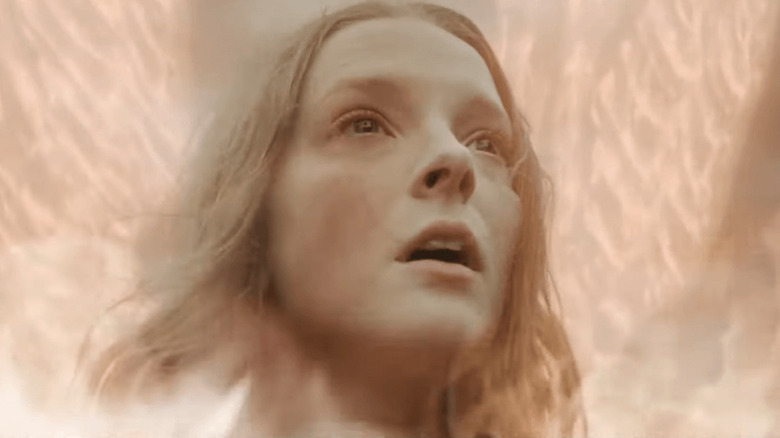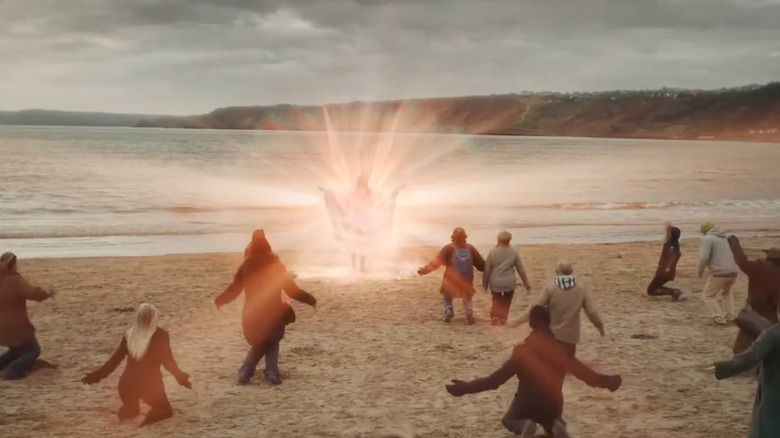The Ending Of Saint Maud Explained
When it comes to directorial debuts, making a strong impression can be hard to do. Even harder is finding a debut that leaves as indelible an impression as the 2019 A24 psychological horror by writer-director Rose Glass, "Saint Maud." The film follows a religious hospice nurse (Morfydd Clark, who went on to play Galadriel in Amazon's "The Lord of the Rings: The Rings of Power") who finds her faith challenged while caring for an aging patient (Jennifer Ehle). Glass' impressive first feature was critically acclaimed amongst its release, with a 93% Tomatometer score on Rotten Tomatoes. Acclaimed director Danny Boyle ("Slumdog Millionaire," "28 Days Later), who helped select the film for its London Film Festival premiere, would refer to "Saint Maud" as being, in his words, "Striking, affecting and mordantly funny at times," while drawing comparisons to the iconic Stephen King adaptation "Carrie" and Jonathan Glazer's 'Under the Skin'" (via What's Worth Seeing).
Through the combination of an unsettling tone, haunting imagery, and terrifying performances, "Saint Maud" is a film that is dense with meaning. Effectively acting as a character study for its titular heroine, the film starts off seeming more straightforward, but gradually becomes something completely different as it explores the internal struggle of its compelling lead. To put it lightly, it's far from your typical horror flick. It all leads up to its eventual finale that is almost guaranteed to leave plenty of viewers scratching their heads. With that said, let's scratch that itch and take a deep dive into the true horrors of "Saint Maud."
Maud and Amanda
Amanda (Jennifer Ehle), who was once a dancer and choreographer, has been diagnosed with Stage 4 lymphoma and Maud (Morfydd Clark) acts as her hospice caregiver. Amanda is an atheist, even giving Maud a book featuring paintings by William Blake that were meant to reject religion. The ever-faithful Maud proceeds to lovingly care for Amanda with glee. In her eyes, she sees Amanda as a challenge given to her by God to not only save her body, but also save her soul. And for a while, it seems as though it's working. The two become closer, with Amanda even calling Maud "her little savior."
Things get complicated when Maud discovers Amanda's lover, Carol (Lily Frazer). She confronts Carol, telling her to not visit. Carol refuses and comes to a party at Amanda's house. The partygoers taunt Maud for her overly religious ways. Maud lashes out, slapping Amanda, which gets her fired. Seeing how their relationship digresses during the course of this section is indicative of Maud and her motivations. Her obsession with Amanda is fascinating to dissect, as she not only seems interested in helping her find God, but appears borderline jealous of her to the point she refuses to share Amanda with anyone. Is it possible that Maud could have deeper feelings towards Amanda? As a devout Christian, this would seem unlikely, but in here lies what "Saint Maud" looks to explore, as two sides of Maud come closer to clashing.
A past life
At the very start of the movie, we see that Maud — literally — has blood on her hands, as she sits next to a dead patient. The full details of this scenario are only hinted at, but we do know that it has hung a great shadow over much of Maud's life. This is evident in her interactions with Joy, a woman Maud used to work with. Joy is surprised when she learns that Maud is still a nurse, likely due to the past event halting her career from progressing any further. Following her dismissal as Amanda's caregiver, Maud goes to a bar where she forces herself to assimilate with average people.
She gets into the flow and has sex with a strange man later that night. During this, she imagines bursting his chest as she applies pressure to it and we flashback to her original patient — because this appears to have been the cause of their death. The man recalls her getting with a friend of his who would call her the "lovely little nurse." Both the man and Joy refer to Maud as Katie, which paints a clearer picture as to her past.
It seems as though Maud was a very different person before her traumatizing events. It seems as though she used to have a budding social life before and her unblinding devotion to God can be seen as a her means of shedding that image. And now, these two sides are at biting odds with one another. She questions her faith and fails to meld with others. Which side will ultimately come through? Well, that's for the ending to decide.
Praise or punishment?
God finally speaks to Maud one night. Speaking in Welsh, He tells her that she is reaching the final test of her faith. What's interesting about this detail is that God is voiced by Maud's actress, Morfydd Clark, using her native Welsh language pitched way down (via Elle).
In doing this, Glass allows us to question Maud's state of mind –- is this truly a battle of faith, or is it a battle with herself? Regardless, Maud starts going through with the "final test." She visits Amanda and the two apologize for their actions, with Maud saying that God forgives everyone. However, the near-death Amanda now fully believes that there is no God. She then turns into a demon and Maud stabs her. Now even her love for Amanda is overtaken with her duty to her faith.
The end sees Maud go out on a beach, donning a jug of acetone. She douses herself in it and lights herself aflame. At first, she glows angelically, as the bystanders drop to their knees. But then, it cuts to Maud burning in agony. The ending is not an easy one, as it shows just how far one's delusion can go. Her drive to save others is something that should be admirable, but in doing so, she spelled her own doom. Maud's desire to run from her past has made her blind to her new dangerous behaviors that lead to her demise. Glass masterfully births a new kind of fear in her audience. Sometimes the scariest things aren't what's around us, it's what's inside us, and having our fate spelled by something we believe is good is more terrifying than any nightmare.



